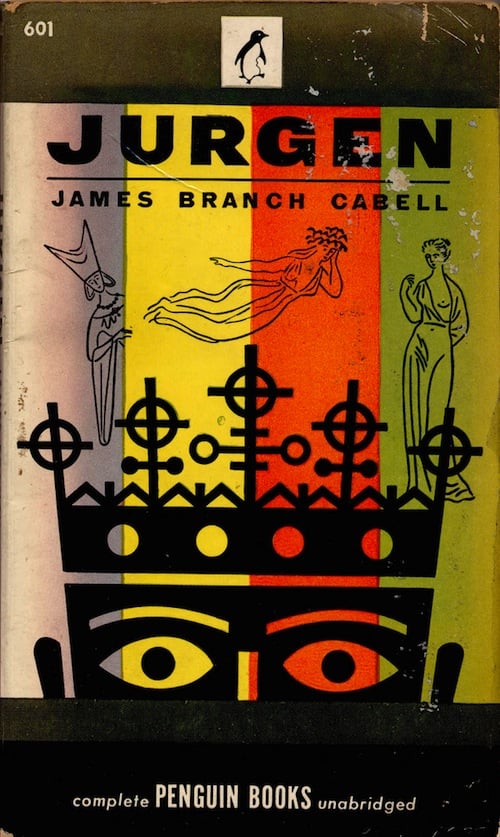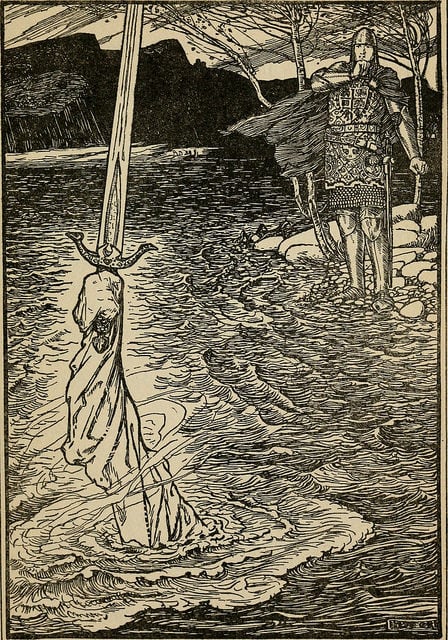Jurgen (26)
By:
September 6, 2015

James Branch Cabell’s 1919 ironic fantasy novel Jurgen, A Comedy of Justice, the protagonist of which seduces women everywhere he travels — including into Arthurian legend and Hell itself — is (according to Aleister Crowley) one of the “epoch-making masterpieces of philosophy.” Cabell’s sardonic inversion of romantic fantasy was postmodernist avant la lettre. HiLoBooks is pleased to serialize Jurgen here at HILOBROW. Enjoy!
But now, as has been recorded, it was September, and Jurgen could see that Anaïtis too was worrying over something. She kept it from him as long as possible: first said it was nothing at all, then said he would know it soon enough, then wept a little over the possibility that he would probably be very glad to hear it, and eventually told him. For in becoming the consort of a nature myth connected with the Moon Jurgen had of course exposed himself to the danger of being converted into a solar legend by the Philologists, and in that event would be compelled to leave Cocaigne with the Equinox, to enter into autumnal exploits elsewhere. And Anaïtis was quite heart-broken over the prospect of losing Jurgen.
“For I have never had such a Prince Consort in Cocaigne, so maddening, and so helpless, and so clever; and the girls are so fond of you, although they have not been able to get on at all with so many of their step-fathers! And I know that you are flippant and heartless, but you have quite spoiled me for other men. No, Jurgen, there is no need to argue, for I have experimented with at least a dozen lovers lately, when I was traveling, and they bored me insufferably. They had, as you put it, dear, no conversation: and you are the only young man I have found in all these ages who could talk interestingly.”

“There is a reason for that, since like you, Anaïtis, I am not so youthful as I appear.”
“I do not care a straw about appearances,” wept Anaïtis, “but I know that I love you, and that you must be leaving me with the Equinox unless you can settle matters with the Master Philologist.”
“Well, my pet,” says Jurgen, “the Jews got into Jericho by trying.”
He armed, and girded himself with Caliburn, drank a couple of bottles of wine, put on the shirt of Nessus over all, and then went to seek this thaumaturgist.
Anaïtis showed him the way to an unpretentious residence, where a week’s washing was drying and flapping in the side yard. Jurgen knocked boldly, and after an interval the door was opened by the Master Philologist himself.
“You must pardon this informality,” he said, blinking through his great spectacles, which had dust on them: “but time was by ill luck arrested hereabouts on a Thursday evening, and so the maid is out indefinitely. I would suggest, therefore, that the lady wait outside upon the porch. For the neighbors to see her go in would not be respectable.”
“Do you know what I have come for?” says Jurgen, blustering, and splendid in his glittering shirt and his gleaming armor. “For I warn you I am justice.”
“I think you are lying, and I am sure you are making an unnecessary noise. In any event, justice is a word, and I control all words.”
“You will discover very soon, sir, that actions speak louder than words.”
“I believe that is so,” said the Master Philologist, still blinking, “just as the Jewish mob spoke louder than He Whom they crucified. But the Word endures.”
“You are a quibbler!”
“You are my guest. So I advise you, in pure friendliness, not to impugn the power of my words.”
Said Jurgen, scornfully: “But is justice, then, a word?”
“Oh, yes, it is one of the most useful. It is the Spanish justicia, the Portuguese justiça, the Italian giustizia, all from the Latin justus. Oh, yes indeed, but justice is one of my best connected words, and one of the best trained also, I can assure you.”
“Aha, and to what degraded uses do you put this poor enslaved intimidated justice!”

“There is but one intelligent use,” said the Master Philologist, unruffled, “for anybody to make of words. I will explain it to you, if you will come in out of this treacherous draught. One never knows what a cold may lead to.”
Then the door closed upon them, and Anaïtis waited outside, in some trepidation.
Presently Jurgen came out of that unpretentious residence, and so back to Anaïtis, discomfited. Jurgen flung down his magic sword, charmed Caliburn.
“This, Anaïtis, I perceive to be an outmoded weapon. There is no weapon like words, no armor against words, and with words the Master Philologist has conquered me. It is not at all equitable: but the man showed me a huge book wherein were the names of everything in the world, and justice was not among them. It develops that, instead, justice is merely a common noun, vaguely denoting an ethical idea of conduct proper to the circumstances, whether of individuals or communities. It is, you observe, just a grammarian’s notion.”
“But what has he decided about you, Jurgen?”
“Alas, dear Anaïtis, he has decided, in spite of all that I could do, to derive Jurgen from jargon, indicating a confused chattering such as birds give forth at sunrise: thus ruthlessly does the Master Philologist convert me into a solar legend. So the affair is settled, and we must part, my darling.”
Anaïtis took up the sword. “But this is valuable, since the man who wields it is the mightiest of warriors.”
“It is a rush, a rotten twig, a broomstraw, against the insidious weapons of the Master Philologist. But keep it if you like, my dear, and give it to your next Prince Consort. I am ashamed to have trifled with such toys,” says Jurgen, in fretted disgust. “And besides, the Master Philologist assures me I shall mount far higher through the aid of this.”
“But what is on that bit of parchment?”

“Thirty-two of the Master Philologist’s own words that I begged of him. See, my dear, he made this cantrap for me with his own hand and ink.” And Jurgen read from the parchment, impressively: “‘At the death of Adrian the Fifth, Pedro Juliani, who should be named John the Twentieth, was through an error in the reckoning elevated to the papal chair as John the Twenty-first.'”
Said Anaïtis, blankly: “And is that all?”
“Why, yes: and surely thirty-two whole words should be enough for the most exacting.”
“But is it magic? are you certain it is authentic magic?”
“I have learned that there is always magic in words.”
“Now, if you ask my opinion, Jurgen, your cantrap is nonsense, and can never be of any earthly use to anybody. Without boasting, dear, I have handled a great deal of black magic in my day, but I never encountered a spell at all like this.”
“None the less, my darling, it is evidently a cantrap, for else the Master Philologist would never have given it to me.”
“But how are you to use it, pray?”
“Why, as need directs,” said Jurgen, and he put the parchment into the pocket of his glittering shirt. “Yes, I repeat, there is always something to be done with words, and here are thirty-two authentic words from the Master Philologist himself, not to speak of three commas and a full-stop. Oh, I shall certainly go far with this.”

“We women have firmer faith in the sword,” replied Anaïtis. “At all events, you and I cannot remain upon this thaumaturgist’s porch indefinitely.”
So Anaïtis put up Caliburn, and carried it from the thaumaturgist’s unpretentious residence to her fine palace in the old twilit wood: and afterward, as everybody knows, she gave this sword to King Arthur, who with its aid rose to be hailed as one of the Nine Worthies of the World. So did the husband of Guenevere win for himself eternal fame with that which Jurgen flung away.
Footnotes from Notes on Jurgen (1928), by James P. Cover — with additional comments from the creators of this website; rewritten, in some instances, by HiLoBooks.
* “Cantrap” is an old Scottish word for a magic spell.
* John the Twentieth — There can be no disputing the Master Philologist’s words; there really was no pope of this name. Pedro Guiliano-Rebulo, who succeeded Adrian V and who held the papal chair from September 8, 1276 to May 20, 1277, was, due to an error in the reckoning caused by the insertion of an anti-pope, named John XXI.
RADIUM AGE SCIENCE FICTION: “Radium Age” is HILOBROW’s name for the 1904–33 era, which saw the discovery of radioactivity, the revelation that matter itself is constantly in movement — a fitting metaphor for the first decades of the 20th century, during which old scientific, religious, political, and social certainties were shattered. This era also saw the publication of genre-shattering writing by Edgar Rice Burroughs, Sax Rohmer, E.E. “Doc” Smith, Jack London, Arthur Conan Doyle, Aldous Huxley, Olaf Stapledon, Karel Čapek, H.P. Lovecraft, Charlotte Perkins Gilman, Yevgeny Zamyatin, Philip Gordon Wylie, and other pioneers of post-Verne/Wells, pre-Golden Age “science fiction.” More info here.
READ GORGEOUS PAPERBACKS: HiLoBooks has reissued the following 10 obscure but amazing Radium Age science fiction novels in beautiful print editions: Jack London’s The Scarlet Plague, Rudyard Kipling’s With the Night Mail (and “As Easy as A.B.C.”), Arthur Conan Doyle’s The Poison Belt, H. Rider Haggard’s When the World Shook, Edward Shanks’ The People of the Ruins, William Hope Hodgson’s The Night Land, J.D. Beresford’s Goslings, E.V. Odle’s The Clockwork Man, Cicely Hamilton’s Theodore Savage, and Muriel Jaeger’s The Man with Six Senses. For more information, visit the HiLoBooks homepage.
SERIALIZED BY HILOBOOKS: Jack London’s The Scarlet Plague | Rudyard Kipling’s With the Night Mail (and “As Easy as A.B.C.”) | Arthur Conan Doyle’s The Poison Belt | H. Rider Haggard’s When the World Shook | Edward Shanks’ The People of the Ruins | William Hope Hodgson’s The Night Land | J.D. Beresford’s Goslings | E.V. Odle’s The Clockwork Man | Cicely Hamilton’s Theodore Savage | Muriel Jaeger’s The Man With Six Senses | Jack London’s “The Red One” | Philip Francis Nowlan’s Armageddon 2419 A.D. | Homer Eon Flint’s The Devolutionist | W.E.B. DuBois’s “The Comet” | Edgar Rice Burroughs’s The Moon Men | Charlotte Perkins Gilman’s Herland | Sax Rohmer’s “The Zayat Kiss” | Eimar O’Duffy’s King Goshawk and the Birds | Frances Hodgson Burnett’s The Lost Prince | Morley Roberts’s The Fugitives | Helen MacInnes’s The Unconquerable | Geoffrey Household’s Watcher in the Shadows | William Haggard’s The High Wire | Hammond Innes’s Air Bridge | James Branch Cabell’s Jurgen | John Buchan’s “No Man’s Land” | John Russell’s “The Fourth Man” | E.M. Forster’s “The Machine Stops” | John Buchan’s Huntingtower | Arthur Conan Doyle’s When the World Screamed | Victor Bridges’ A Rogue By Compulsion | Jack London’s The Iron Heel | H. De Vere Stacpoole’s The Man Who Lost Himself | P.G. Wodehouse’s Leave It to Psmith | Richard Connell’s “The Most Dangerous Game” | Houdini and Lovecraft’s “Imprisoned with the Pharaohs” | Arthur Conan Doyle’s “The Sussex Vampire.”
ORIGINAL FICTION: HILOBROW has serialized three novels: James Parker’s The Ballad of Cocky The Fox (“a proof-of-concept that serialization can work on the Internet” — The Atlantic); Karinne Keithley Syers’s Linda Linda Linda (which includes original music); and Robert Waldron’s roman à clef The School on the Fens. We also publish original stories and comics. These include: Matthew Battles’s stories “Gita Nova“, “Makes the Man,” “Imago,” “Camera Lucida,” “A Simple Message”, “Children of the Volcano”, “The Gnomon”, “Billable Memories”, “For Provisional Description of Superficial Features”, “The Dogs in the Trees”, “The Sovereignties of Invention”, and “Survivor: The Island of Dr. Moreau”; several of these later appeared in the collection The Sovereignties of Invention | Peggy Nelson’s “Mood Indigo“, “Top Kill Fail“, and “Mercerism” | Annalee Newitz’s “The Great Oxygen Race” | Flourish Klink’s Star Trek fanfic “Conference Comms” | Charlie Mitchell’s “A Fantasy Land” | Charlie Mitchell’s “Sentinels” | Joshua Glenn’s “The Lawless One”, and the mashup story “Zarathustra vs. Swamp Thing” | Adam McGovern and Paolo Leandri’s Idoru Jones comics | John Holbo’s “Sugarplum Squeampunk” | “Another Corporate Death” (1) and “Another Corporate Death” (2) by Mike Fleisch | Kathryn Kuitenbrouwer and Frank Fiorentino’s graphic novel “The Song of Otto” (excerpt) | John Holbo’s graphic novel On Beyond Zarathustra (excerpt) | “Manoj” and “Josh” by Vijay Balakrishnan | “Verge” by Chris Rossi, and his audio novel Low Priority Hero | EPIC WINS: THE ILIAD (1.408-415) by Flourish Klink | EPIC WINS: THE KALEVALA (3.1-278) by James Parker | EPIC WINS: THE ARGONAUTICA (2.815-834) by Joshua Glenn | EPIC WINS: THE MYTH OF THE ELK by Matthew Battles | TROUBLED SUPERHUMAN CONTEST: Charles Pappas, “The Law” | CATASTROPHE CONTEST: Timothy Raymond, “Hem and the Flood” | TELEPATHY CONTEST: Rachel Ellis Adams, “Fatima, Can You Hear Me?” | OIL SPILL CONTEST: A.E. Smith, “Sound Thinking | LITTLE NEMO CAPTION CONTEST: Joe Lyons, “Necronomicon” | SPOOKY-KOOKY CONTEST: Tucker Cummings, “Well Marbled” | INVENT-A-HERO CONTEST: TG Gibbon, “The Firefly” | FANFICTION CONTEST: Lyette Mercier’s “Sex and the Single Superhero”
